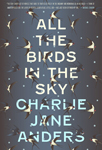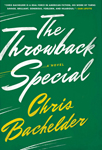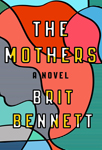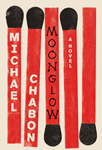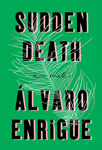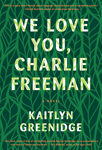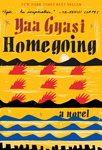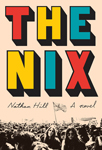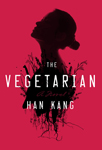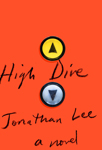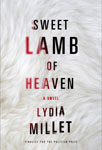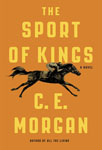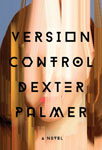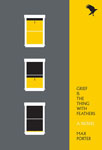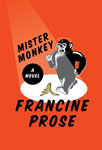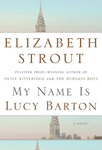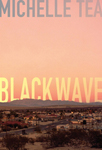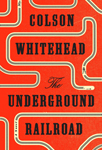by Charlie Jane Anders
Buy it at Powell’s »Isaac Fitzgerald: Expectations are hard. Though it must be nice to arrive on a scene already garlanded in glory, it just seems way better to be an underdog—how much easier it is to slink in through the side door and take everyone by surprise, rather than glide in on the red carpet, everyone impatiently waiting for you, their arms ready to cross, eyes just aching to roll backward. But maybe that’s just me.
As it happens, the two books in today’s match came into the world both buoyed and burdened by high expectations: The Nix, the debut novel by Nathan Hill, published to great praise and hype from the likes of John Irving. And then there’s The Underground Railroad by Colson Whitehead, the publication date of which was literally pushed up by a month because it was chosen by Oprah herself for her book club. (Which, holy shit.)
So I was happy to have had the opportunity to reread these books with the benefit of a little more distance. To read them not as publishing juggernauts, but just as books, plain and simple. Not to mention that the Zombie Round is practically made for reconsidering everything you thought you knew.
Let’s start with The Nix, which centers on a college professor confronting his estranged mother, but also covers the 1968 Chicago riots, Occupy Wall Street, MMORPGs, Norwegian folklore, and a whopping shit-ton more within its 620 pages. First off, it’s incredibly enjoyable basically the whole way through, and impressively sweeping, not just in terms of milieu but also style. Big, bouncy, and endearing, The Nix has a real one-man band feel to it, like how is all that sound coming from one person?
Starting out with a boy named Samuel, whose mother suddenly leaves him and his father one day, Hill spins a complex and inventive saga, spanning a multitude of perspectives. Of course there’s Samuel himself, who grows up to be an aimless college professor, addicted to an online game called World of Elfscape and stalled out after publishing one story in a magazine that is left unnamed, but is not not the New Yorker. There’s his mother, Faye, who reenters Samuel’s life decades after leaving the family when a video of her throwing rocks at a conservative governor goes viral. And then there’s also Faye’s father, and an activist friend of Faye’s, and so on.
Even when the characters are jerks, like an infatuated cop or a student who is the epitome of every shitty millennial stereotype, Hill wants to give everyone their say, to compel us to understand why they are the way they are, to show us why they do the things they do. It’s a good-hearted impulse, and it makes for an entertaining and multi-faceted reading experience. (Hill especially grabbed my heart with a peripheral character named Pwnage, a skilled World of Elfscape player and divorcé in spectacularly ill health, who continually makes doomed attempts to stop dicking around online and improve his life. Let’s not think about why I related to this so hard.)
The Nix wants to show us so much, which is both its glory and, for me, one of its problems. It is an empathetic book—it wants to make everything it touches comprehensible. It is a big book that, through so much explaining, ultimately shrinks the world into a manageable size. (This isn’t helped by the preponderance of coincidences, and the tendency for characters to turn out to be other characters.) At times it over-explains, leaving little to mystery or chance, an impulse described here:
…if you choose to see people as puzzles, and if you see yourself as a puzzle, then you will be constantly delighted, because eventually, if you dig deep enough into anybody, if you really look under the hood of someone’s life, you will find something familiar. This is more work, of course, than believing they are enemies. Understanding is always harder than plain hatred.
Throughout, The Nix is intelligent about the spectacle of politics, whether in 1968 or 2011. But it ends with the conservative wackjob of a governor running for president and makes this seem oddly weightless, almost incidental. It feels like The Nix could imagine someone Trump-esque but could not imagine him succeeding, or if it does, does not imagine that this will affect any of its characters, most of whom end the book in a state of grace.
Like and not at all like The Nix, The Underground Railroad features a character marked by the departure of their mother. Cora, a slave on a Georgia cotton plantation, is 10 or 11 when her mother seemingly runs away, leaving Cora alone and adrift. A few years later, Cora makes her own escape, journeying north on the underground railroad with a young man named Caesar.
And, of course, the underground railroad as Whitehead has conceived it is an actual railroad, traveling underground in a system of tracks and tunnels. It’s a brilliant, tricky move, taking the historical reality of the underground railroad and twisting it—deadpan, seamless—into the thing that schoolchildren have often mistakenly imagined it to be. As the train makes various stops, Whitehead’s is-it-or-isn’t-it light touch when it comes to fantastical elements continues—which are not fantastical, really, so much as unstuck in time and juxtaposed more closely with slavery.
The Underground Railroad reads like the work of a master, someone who has written many books and many different kinds of books, yet has an unmistakable voice. And The Underground Railroad stretches that voice, extends Whitehead’s writerly reach even further. Though it is audacious and playful, imaginative and daring, it also contains the confidence to be utterly straightforward: It is deadly serious, too. It is about life and death, joy and suffering, freedom and enslavement. Through the trips on the imaginary railroad, the visits to anachronistic cities and bitingly satirical museum exhibits, you are never in any doubt about the reality and seriousness of Cora’s plight. Here and there are brutal, epigrammic lines sharply reminding you of the nature of the world Cora and the slaves live in: “Her price fluctuated. When you are sold that many times, the world is teaching you to pay attention.”
There is a chill and a distance to The Underground Railroad. Though you get to know Cora—you’re biting your nails while reading and flipping ahead to see what happens because you’re so worried for her—Whitehead keeps us at arm’s length. For Cora, there can be no good place; there are only places better or worse than others, temporary oases she must constantly leave. The consolation is that from time to time Cora finds good people, and that Cora survives through strength and bravery and luck. But there can be be no true, ultimate consolation in a country that has been marked by the evil of slavery, and that is still marked to this day.
While I greatly enjoyed reading both of these novels again, The Nix can’t help that even while reconsidering everything, à la the Zombie Round, I once again came to the same conclusion: that The Underground Railroad was the best book of 2016, will be one of the best books of the decade and perhaps more. There is a mystery to its truth, a sense of the unsolvable, that will keep us all reading it for years to come.
Match Commentary
By Land Arnold & Rosecrans Baldwin
Rosecrans Baldwin: Today we’re joined in the commentary booth by Land Arnold, the owner of Letters Bookshop in Durham, NC. Land, how’s the independent bookselling world of Bull City?
Land Arnold: Hello, everybody! Excited to be part of every bookseller’s favorite tournament (also, go UNC in that other one). I’m lounging in the reading nook at Letters Bookshop, located in the heart of downtown Durham, which is located where the heart of an often heartless North Carolina would be. Out the back window of the shop I can see an actual railroad that serviced the original Bull Durham tobacco warehouse, which became a national brand when Union soldiers, waiting on the largest confederate surrender to end the Civil War at nearby Bennett Place, liked the tobacco. Soon after, despite Jim Crow laws, a financial hub for African Americans dubbed Black Wall Street grew just a couple of blocks away, though it mostly succumbed to racially motivated and cruel urban planning in the 1960s. But Durham was resurrected in the 1980s by Kevin Costner having sex with Susan Sarandon in a tub in the baseball classic Bull Durham, and has rode that wave with a few bumps to become a food, music, and startup incubator now full of hipster moustaches and nominees for James Beard awards.
Rosecrans: As a previous resident of Chatham County, not too far away, that all sounds right.
What’s your general impression of Judge Fitzgerald’s verdict? One way he distinguishes between these books is by the authors’ time in the game and how it shows up on the page. Hill is a debut author and Fitzgerald suggests his book suffers a little for overreaching. Whitehead is credited for being a pro. Did that strike a chord for you?
Land: I agree with Judge Fitzgerald’s verdict, if not most of his well-reasoned analysis. This felt like an unfair matchup between the raw but talented and energetic Hill and Whitehead, a seasoned master. And although Hill crams so much of contemporary life in his novel, like gaming culture and far-right populist politics, Whitehead’s novel seems much more relevant. The Nix tends to the many splinters of our contemporary lives; The Underground Railroad points out its deepest scar.
I think Judge Fitzgerald is right that The Nix is quite a one-man band performance, and while I was impressed when he played the cymbal with his big toe, I often wanted him to stick to the harmonica. This is especially true in scenes like the one with the cheating student—it felt more like a “Shouts and Murmurs” piece than the building of a well-wrought character. Even Andrew Bird played just one instrument on Squirrel Nut Zippers records (North Carolina!) before playing almost all of them on his Noble Beast album. But it is hard not to get swept away in the energy of The Nix, and it is obvious that Hill’s got the chops to refine his musicianship. The Nix brought to mind another exuberant first novel from some years back, A Fraction of the Whole by Steve Toltz—if you loved The Nix, you will love this book too. Guess that’s the bookseller in me.
Rosecrans: If I can go off-topic for a second, one of the things I always loved about visiting your shop when I lived nearby—and also your previous place of employment, the wonderful Flyleaf Books of Chapel Hill—is your talent for suggesting books (much like John, our Biblioracle). Rooster readers, next time you’re in Durham, seek out Land and he’ll tell you what to read next.
Land: Speaking of upselling: The Sellout and The Good Lord Bird, two of my favorites from the past few years (and two past Rooster winners) are must-reads if you like The Underground Railroad. I’ve been chewing over a similarity between all three of these books today without coming to a wholly satisfying answer. All three have at their core an unlikelihood or impossibility. The cross-dressing narrator of The Good Lord Bird, the Supreme Court-facing, modern-day slaveholding African-American narrator of The Sellout, and of course the underground railroad being an actual railroad. Does it make it easier to see the truth in travesty if it contains the release valve of a central fantastic element?
Rosecrans: There’s been extensive discussion of both of these books by the ToB commentariat, particularly about a novelist’s responsibilities when it comes to history. Judge Fitzgerald may say “you are never in any doubt about the reality and seriousness of Cora’s plight,” but at the same time there are anecdotes of readers who now believe or already believed the underground railroad was an actual system of rails and trains (as recently pointed out in Monday’s commentary, for example). Let’s be specific about this. You’re a bookseller in the South. What’s been your experience in selling these books, particularly The Underground Railroad, and seeing them discussed?
Land: When I first heard about the actual underground railroad in elementary school, I was living in Atlanta and we took a walk to a nearby house in an affluent neighborhood to look at a hidden spot in the basement that was (supposedly) used to hide humans. It wasn’t on a historical register or anything then, so we were encouraged to step inside the cramped space one at a time. I hadn’t thought about that in a long time until reading The Underground Railroad. Time diminishes and changes memories, but great books can bring them back.
The Underground Railroad sells exceptionally well. It was an Oprah pick, on Obama’s last summer reading list as president (a tear for the Reader-in-Chief), and winner of the National Book Award, so that’s not a huge surprise, but I think it is part of a greater trend. The same way we are seeing box office hits in Hidden Figures and Get Out, books like The Underground Railroad and Between the World and Me are bestsellers—there is a huge market for diverse and challenging stories. Between the World and Me is by far the all-time bestselling book at Letters, followed by We Should All Be Feminists and The New Jim Crow. I don’t hear a lot of specific talk about the books in the shop more than an occasional superlative. What I do see is friends bringing friends into the shop and saying “you have to read this” and not letting them leave without it. Ninety percent of Durham did not vote for Trump, so we are one of a few blue pockets in a red state; people are using books to weaponize themselves. I’d like to challenge Nate Silver to redeem himself from the election and corroborate this fact: The more you read to children, the better the world will be.
Rosecrans: What is the shape of independent bookselling from your perspective?
Land: With some of the celebrity book tastemakers out of the national spotlight—like Obama, Diane Rehm, and Jon Stewart—I think your local indie bookseller has to continue to give those personal recommendations and even grow that role. I also think the public is recognizing that more and more. Whenever I have people from out of town at the shop, I ask them who their local indie bookseller is, and if they don’t know I go to indiebound.org, search their city, and tell them the closest one. I want them to take their good one-off experience in my shop and take it home to make it routine. I also like to support the institutions that do promote books.
And that’s also why I like the Tournament of Books so much. Not only does it give the most viewpoints on each title, it really is an incredible resource to booksellers—because sometimes (but only sometimes; rarely, even), when we know we’ve handed the perfect book to someone but haven’t actually read it ourselves, we can say we have.
Kevin Guilfoile: Many thanks to Judge Fitzgerald and Land Arnold for helping us out today. Tomorrow, First Look Media’s Reyhan Harmanci makes a ruling from the bench, sending either Homegoing or The Vegetarian to face off against The Underground Railroad in the finals.



